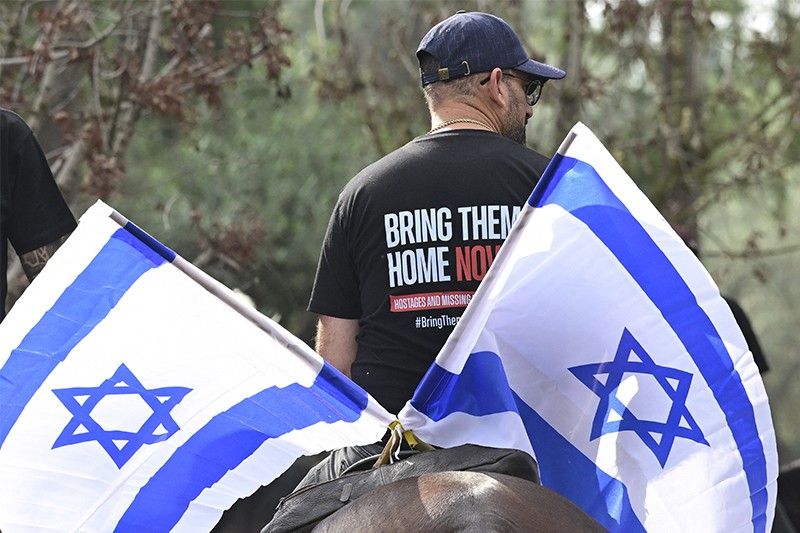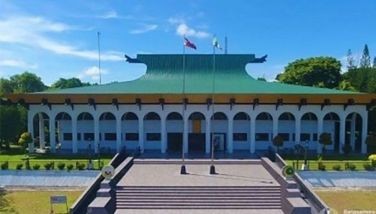Hostages on 60th day in Gaza as freed captives meet Israel PM

JERUSALEM, Undefined — As Israel marked Tuesday the 60th day that nearly 140 hostages are held by Gaza militants, a group of former captives met the country's prime minister to urge him to secure the release of those left behind.
A one-week truce in fighting between Israel and Palestinian armed group Hamas saw 105 hostages return from the Gaza Strip, including 80 Israelis -- mostly women and children -- exchanged for 240 Palestinians jailed by Israel.
But the truce collapsed on Friday and mediation efforts for more releases have stalled, with fierce combat resuming and southern Gaza now bearing the brunt.
The war was triggered by Hamas's unprecedented October 7 attacks on southern Israel, which officials say killed 1,200 people, mostly civilians, and saw about 240 snatched into the Hamas-ruled Gaza Strip.
Israel on Tuesday said 138 hostages still remain in the narrow Palestinian territory.
An intense Israeli military campaign since October 7, aimed at destroying Hamas and freeing captives, has killed more than 16,200 people in Gaza, according to the Hamas government.
In a meeting with Prime Minister Benjamin Netanyahu and some Israeli cabinet members, released hostages and family members called for immediate action for the release of remaining captives.
"I asked Netanyahu if the primary objective of the war was to bring back the hostages," Meirav Leshem Gonen, mother of 23-year-old hostage Romi Gonen, told Israeli television after the meeting.
"He answered me directly: 'yes'," she said. "I am happy with his answer, but only reality counts."
Leshem Gonen said she was concerned that hostages were being "severely mistreated -- women, young girls, and men too".
Israeli media reported the sit-down as being tense.
In televised remarks after the meeting, Netanyahu said he had "heard heart-rending stories, of hunger and thirst" as well as "about cases of sexual abuse and cruel rapes".
He slammed international women's and human rights organisations for what he said was their silence on the issue.
"Where the hell are you?" Netanyahu said.
He went on to say the government would "spare no effort to bring back our loved ones".
Dozens of protesters, meanwhile, gathered outside a government building in Tel Aviv to call for a permanent ceasefire and the liberation of the remaining hostages.
"This cycle of revenge must end," said Barak Heymann. "And Israel is responsible right now to stop the fire, to bring (back) the hostages and to look for a solution."
'Too much'
A health ministry official on Tuesday accused the Palestinian militants of giving sedatives to hostages released during the truce to make them appear "calm and happy" when they were handed over to the International Committee of the Red Cross.
Hagar Mizrahi, head of general medicine at the Israeli health ministry, made the allegation at a parliamentary session, without specifying whether it was based on blood tests or hostages' accounts.
Some families, meanwhile, appeared to be losing patience, fearing for their loved ones still inside Gaza.
"We have faith in our children, that they are strong and they will overcome this, and we want our government and the military to do what they do as fast as they can -- as fast as possible -- to start the negotiations," said Idit Ohel, the mother of 21-year-old hostage Alon, during an online panel organised by the Hostages and Missing Families Forum.
"Sixty days is too much," she said, her voice rising. "I don't want 61 days, I don't want 65 days. I want them back now."
The day after the truce lapsed, Israel withdrew its negotiators from Qatar after hitting a dead end in talks aimed at securing a renewed pause in hostilities.
Hamas, for its part, has ruled out more hostage releases until a permanent ceasefire is agreed.
Ohel went on to call for "other governments to help" bring about the release of the remaining hostages.
'Built on hope'
Speaking at the same panel, Iris Haim described her son Yotam's mounting fear as the attack unfolded on October 7, captured in voice and text messages sent from his safe room.
Militants eventually set fire to his house in Kfar Aza, a kibbutz community near the Gaza border, before hauling him away.
"For a half hour he just asked for help: 'Please, please, send somebody, I don't have air, I cannot breathe.' And we couldn't help," said Haim.
Eli Shtivi, whose son Idan, 28, was kidnapped on October 7, organised a horseback ride from the outskirts of the city of Modiin to Jerusalem, roughly 25 kilometres (15 miles) away, to call for his release.
Riding was a hobby the two shared in better times, and Shtivi was joined by around 100 supporters.
"I trust the government," he said as he got ready for the ride, predicting that within "one week" all those kidnapped would be freed.
But fellow rider Ilan Traitel said it was "a very complicated situation".
"We hope," he added. "We are a country that is built on hope."
- Latest
- Trending
































